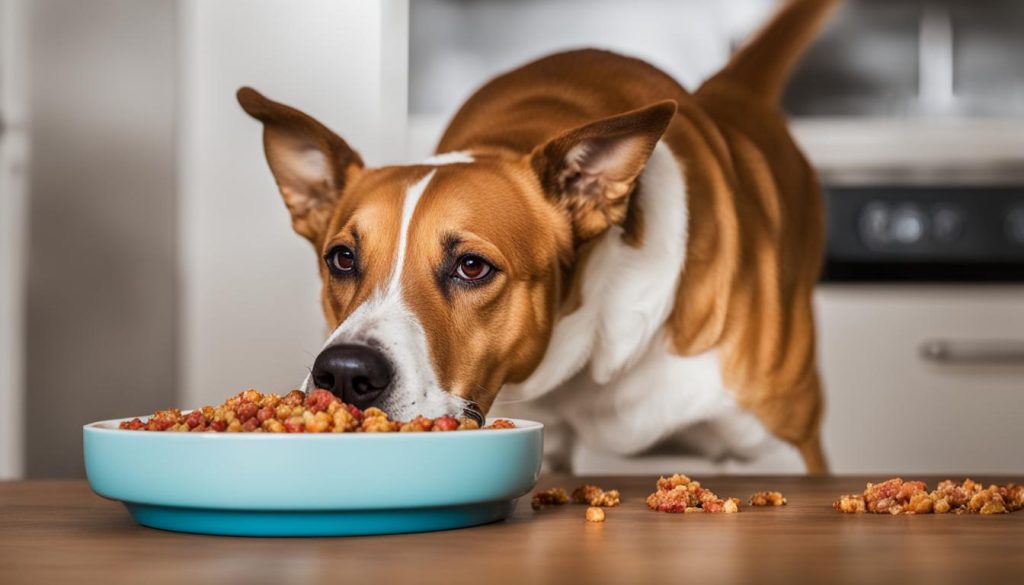Have you ever found yourself wondering, “Why won’t my dog eat?” Loss of appetite in dogs can be a concerning issue for pet owners. It’s important to understand the potential causes and explore possible solutions to ensure your furry friend’s well-being.
There are several reasons why your dog may not be eating. It could be due to illness, dental disease, recent vaccination, travel or unfamiliar surroundings, or behavioral issues. Recognizing the underlying cause is crucial in addressing the problem effectively.
If your dog is experiencing a prolonged loss of appetite, it’s essential to seek veterinary care. It could be a sign of a more serious underlying condition that requires medical attention. Your veterinarian can help diagnose the issue and provide appropriate treatment.
Key Takeaways:
- Loss of appetite in dogs can have various causes, including illness, dental disease, travel, and behavioral issues.
- If your dog is not eating, it’s important to consult with a veterinarian to determine the underlying cause and develop a suitable solution.
- Prolonged loss of appetite may indicate a serious underlying condition that requires medical attention.
- Paying attention to your dog’s eating habits and seeking prompt veterinary care can help ensure their overall well-being.
- Implementing strategies such as regular feeding schedules, creating a comfortable environment, and trying different food options can help stimulate your dog’s appetite.
Illness as a Cause of Loss of Appetite in Dogs
A decreased appetite in dogs is often a sign of illness. When your furry friend refuses to eat, it could indicate more serious underlying conditions such as cancer, systemic infections, pain, liver problems, or kidney failure. It’s vital to seek prompt veterinary attention to diagnose and treat the illness causing the loss of appetite.
If your dog is not eating, it can be distressing, but understanding that it could be a symptom of an illness is crucial. Dogs are instinctually driven to eat, so a consistent decrease in appetite should raise concern and prompt a visit to the veterinarian.
When an illness is causing your dog’s loss of appetite, it’s essential to address the underlying health issue. Your veterinarian will conduct a thorough examination, perform diagnostic tests, and develop an appropriate treatment plan based on the diagnosis. This may involve medication to manage pain or infection, dietary changes, or other interventions specific to the illness.
Remember, loss of appetite could be an early warning sign of a serious condition. Identifying and treating the illness promptly is crucial for your dog’s well-being and overall quality of life.
Dental Disease and its Impact on Appetite
Dental disease is a common problem in dogs that can significantly impact their appetite. Just like humans, dogs can develop various oral health issues that cause pain, discomfort, and difficulty in eating. This can result in a loss of appetite and reluctance to consume their regular meals.
One of the primary causes of appetite problems in dogs with dental disease is broken or loose teeth. When a tooth is damaged or becomes loose, it can make it uncomfortable or even painful for the dog to chew their food properly. As a result, they may start avoiding food altogether or only eat small amounts due to the discomfort.
Another dental condition that can affect a dog’s appetite is severe gingivitis. Gingivitis is an inflammation of the gums that occurs when plaque and tartar build-up along the gumline. If left untreated, it can progress to periodontal disease, causing pain, redness, and swelling in the gums. Dogs with severe gingivitis may experience pain while eating, leading to a decrease in their appetite.
In some cases, dental disease can also manifest as oral tumors, which can hinder a dog’s ability to eat properly. These tumors can grow in various parts of the mouth, making it difficult to chew or swallow food. Dogs with oral tumors may exhibit a significant decrease in appetite as the tumors cause discomfort and pain.
To ensure that your dog’s dental health doesn’t impact their appetite, it’s essential to prioritize regular dental check-ups. A veterinarian can examine your dog’s teeth and gums, identifying any signs of dental disease early on. Early intervention can prevent the condition from progressing and minimize the impact on your dog’s appetite.
In conclusion, dental disease can have a significant impact on a dog’s appetite. Broken or loose teeth, severe gingivitis, and oral tumors can all cause discomfort and pain, leading to decreased food intake. By prioritizing regular dental care and seeking professional veterinary assistance, you can help address dental issues and ensure your dog maintains a healthy appetite.
Vaccinations and Temporary Loss of Appetite
When dogs receive vaccinations, it is not uncommon for them to experience a temporary loss of appetite. These effects are usually minor and brief, but it is still important to keep an eye on your dog’s eating habits.
If your dog is not eating after vaccinations, don’t panic. It is a normal response for some dogs to have a reduced appetite for a day or two. The vaccination stimulates the immune system, which can cause a mild inflammatory response and temporary discomfort in some dogs.
To help your dog through this temporary loss of appetite, make sure they stay hydrated and offer them small, easily digestible meals. You can try warming their food slightly or adding a small amount of low-sodium chicken broth to make it more enticing. Be patient and understanding during this time as your dog may need a little extra care and attention.
When to Consult Your Veterinarian
While a temporary loss of appetite after vaccinations is normal, there are situations where you should consult your veterinarian:
- If your dog’s loss of appetite persists for more than 48 hours
- If your dog is experiencing other concerning symptoms such as lethargy, vomiting, diarrhea, or fever
- If your dog has a history of severe reactions to vaccinations
Your veterinarian can determine if there is an underlying issue causing the loss of appetite and recommend appropriate treatment if necessary. Remember, it is always better to be safe than sorry when it comes to your furry friend’s health.
Travel and Change in Environment
Dogs can sometimes experience a loss of appetite when they travel or are introduced to unfamiliar surroundings. This can be due to various factors such as motion sickness, nervousness, or discomfort in new places. If your dog is not eating while traveling or in new environments, it is essential to address this issue to ensure their well-being.
One possible reason for a dog’s refusal to eat while traveling is motion sickness. Similar to humans, dogs can get nauseous and uncomfortable during car rides or long journeys, leading to a loss of appetite. To help alleviate motion sickness, consider talking to your veterinarian about medications or natural remedies that can help calm your dog’s stomach.
In addition to motion sickness, dogs may also feel nervous or anxious in new environments. Being in an unfamiliar place can disrupt their normal routine and make them feel uneasy, which can affect their appetite. To help your dog feel more comfortable and stimulated to eat, try to establish a familiar routine even while traveling. Stick to their regular feeding schedule as much as possible and try to create a calm and quiet environment for mealtimes.
Another strategy to encourage your dog to eat while traveling or in new environments is to bring familiar items from home. Dogs rely heavily on their sense of smell, so having familiar scents around can help promote a sense of security and appetite stimulation. Consider bringing their bed, favorite toys, or even a shirt with your scent on it to provide a sense of familiarity and comfort.
Behavioral Issues and Picky Eating
Some dogs can be picky eaters or may refuse to eat due to behavioral issues. It’s important to address these concerns to ensure your dog maintains a healthy appetite. Here are some strategies to help stimulate your dog’s appetite:
- Provide a Comfortable Environment: Create a calm and stress-free environment during mealtimes. Avoid distractions, loud noises, or other factors that may cause anxiety for your dog.
- Establish a Regular Feeding Schedule: Dogs thrive on routine, so establish a consistent feeding schedule. This will help regulate their hunger and make them more receptive to meals.
- Use Food Puzzles or Interactive Toys: Engaging your dog’s mind during mealtime can make it more enjoyable. Use food puzzles or interactive toys to stimulate their natural instincts and keep them entertained while eating.
Are there any underlying medical conditions?
Before assuming that your dog’s refusal to eat is solely a behavioral issue, it’s crucial to rule out any underlying medical conditions. Loss of appetite can be a symptom of various health problems, including dental disease, illness, or pain. If your dog’s picky eating persists or is accompanied by other concerning symptoms, consult with your veterinarian for a thorough examination.
Strategies to Encourage a Dog to Eat
To encourage a dog to eat, it is important to work with your veterinarian to determine the cause of the loss of appetite. If it is due to illness, a prescription diet or appetite-stimulating medications may be recommended. Here are some tips and strategies to help stimulate your dog’s appetite:
- Cut back on treats: Offering fewer treats throughout the day can make mealtime more enticing for your dog. Limiting the number of snacks will make your dog hungrier and more likely to eat their regular meals.
- Feed on a regular schedule: Establishing a consistent feeding routine can help your dog develop healthy eating habits. Feed your dog at the same times each day to create a sense of structure and predictability.
- Make mealtime fun: Try interactive feeding toys or puzzles to engage your dog during mealtime. These toys can provide mental stimulation and make eating more enjoyable for your dog.
- Try different food options: If your dog is refusing to eat their regular food, consider offering different flavors or textures. You can also try mixing in some high-quality wet food or adding a small amount of low-sodium broth to entice your dog.
Remember, it’s important to be patient and consistent when encouraging your dog to eat. If you’re concerned about your dog’s appetite, always consult with your veterinarian for personalized advice and recommendations.

Conclusion
Loss of appetite in dogs can be a concerning sign for pet owners. It may be caused by various factors, including illness, dental disease, travel, or behavioral issues. If your dog is not eating, it is important to seek veterinary care to determine the cause and ensure their overall well-being.
When it comes to how to make a dog eat, working closely with your veterinarian is crucial. They can help diagnose any underlying health problems and provide appropriate treatment. Additionally, your veterinarian can guide you on implementing strategies to stimulate your dog’s appetite and encourage them to eat.
Depending on the root cause, solutions may include prescribing a specialized diet or appetite-stimulating medications. If the loss of appetite is due to behavioral issues, your veterinarian may recommend changes in feeding routines, using food puzzles or interactive toys, or trying different types of food options. It is important to be patient and consistent in implementing these strategies.
Remember, your dog’s health and well-being depend on their ability to eat and receive adequate nutrition. By addressing the underlying issues and following the guidance of your veterinarian, you can help your furry friend regain their appetite and enjoy a happier, healthier life.
FAQ
Why won’t my dog eat?
Loss of appetite in dogs can be caused by various factors, including illness, dental disease, recent vaccination, travel or unfamiliar surroundings, and pickiness or behavior issues.
What are the reasons for a dog not eating?
A dog may not eat due to illness, dental disease, travel or unfamiliar surroundings, or behavioral issues.
Is loss of appetite in dogs a sign of illness?
Yes, a decreased appetite in dogs is often a sign of illness, including serious conditions such as cancer, systemic infections, pain, liver problems, or kidney failure. Veterinary attention is important to diagnose and treat the underlying illness causing the loss of appetite.
How does dental disease affect a dog’s appetite?
Dental disease can cause pain and discomfort for dogs, leading to a loss of appetite. Broken or loose teeth, severe gingivitis, and oral tumors can make it difficult for a dog to eat. Regular dental check-ups are important to identify and address any dental issues that may be contributing to the loss of appetite.
Can vaccinations cause temporary loss of appetite in dogs?
Yes, some dogs may experience temporary loss of appetite after receiving vaccinations. While these effects are usually minor and brief, it is important to monitor your dog’s eating habits and consult with your veterinarian if the loss of appetite persists or is accompanied by other symptoms.
Why does my dog lose appetite when we travel or in unfamiliar surroundings?
Dogs can experience loss of appetite when they travel or are introduced to unfamiliar surroundings. Motion sickness, nervousness, or discomfort in new places can contribute to a dog’s refusal to eat. Providing a familiar routine and creating a comfortable environment can help stimulate the dog’s appetite.
Can behavioral issues cause a dog to stop eating?
Some dogs are picky eaters or may refuse to eat due to behavioral issues. Feeding them in a comfortable and stress-free environment, establishing a regular feeding schedule, and using food puzzles or interactive toys can help stimulate their appetite. It is important to rule out any underlying medical conditions before assuming it is solely a behavioral issue.
How can I encourage my dog to eat?
To encourage a dog to eat, it is important to work with your veterinarian to determine the cause of the loss of appetite. If it is due to illness, a prescription diet or appetite-stimulating medications may be recommended. If it is a behavioral issue, cutting back on treats, feeding on a regular schedule, making mealtime fun, and trying different food options can help stimulate the dog’s appetite.
What should I do if my dog is not eating?
If your dog is not eating, it is important to seek veterinary care, as it could be a sign of an underlying health problem. Working with your veterinarian to determine the cause and implementing strategies to stimulate your dog’s appetite can help resolve the issue and ensure their overall well-being.






